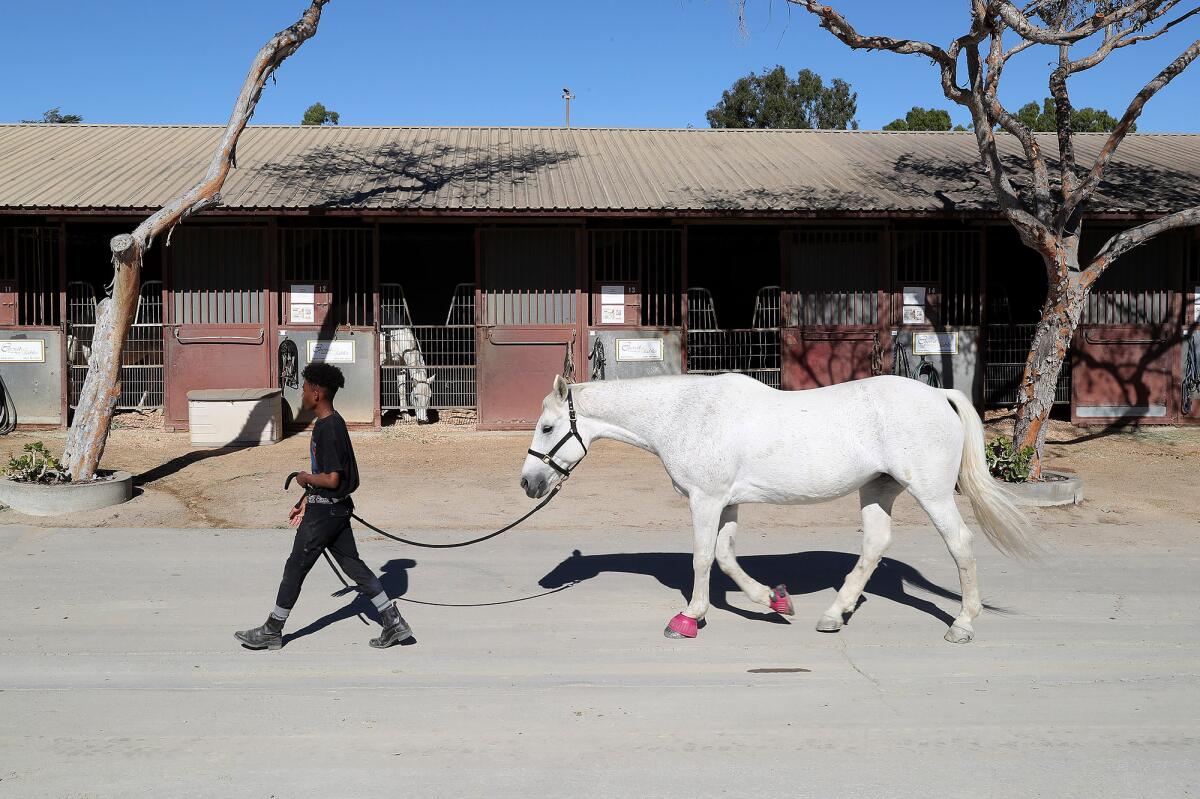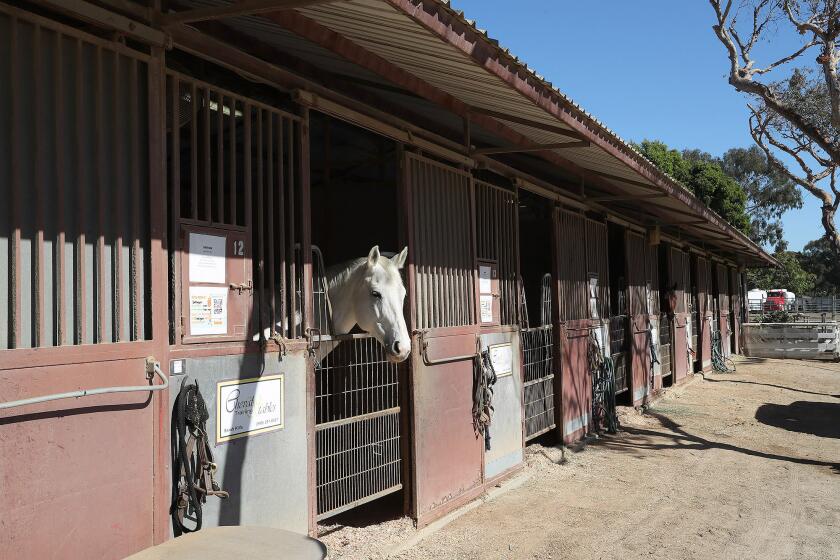O.C. fairground equestrians bridle at proposed fee hikes

- Share via
As Orange County fairgrounds officials reimagine the site’s Equestrian Center into a space for more public programming, board members looking to reduce an operational deficit approved this week a rent hike for those who keep horses at the facility.
OC Fair & Event Center leaders maintain the move will help the center, which assumed operations of the 7.5-acre Costa Mesa site in 2023, recover from an annual loss of more than $1 million.
But equestrians maintain the loss stems not from too-low rents, but from an exorbitant contract for maintenance and cleaning of the site approved by officials when they took over.
OCFEC Executive Director Michele Richards in a board meeting Thursday provided a progress report on staff’s efforts to maintain private boarding services in five barns on the western half of a newly rebranded Community Equine Center, while creating public programs in four barns and two arenas on the other half of the property.
There, visitors could participate in accredited equine therapy programs, school and public tours offering hands-on experiences and small regional horse shows, among other activities. Horses in those programs would be leased, although Richards did not say from where.
Equestrians operating at the Costa Mesa facility will have until June to conduct business as usual but will be included in plans to transition the site toward more public programming, the O.C. Fair Board decided Thursday.
“The plan is to establish two different programs at the current Equestrian Center,” she told board members Thursday. “Staff and the Facilities Committee feel it’s important to separate the activities to ensure the safety of the privately owned horses and control public access to those barns.”
Richards also presented directors with a phased-in plan for raising the monthly boarding fees for 100 private-use stalls over the next nine months. Costs will gradually climb from $644 per month for a 144-square-foot stall to $1,103 by January 2025 with a proportionate increase anticipated for larger stalls.
Those rates would afford 100% access to a large arena and access to smaller nearby arenas, round pens and turnouts when not in use by public programs and would cover trash and manure removal, associated staff costs and utilities. Trainers wishing to conduct lessons, camps and other activities would pay an additional $400 monthly facility use fee.
By comparison, the San Juan Capistrano Equestrian Center charges $910 per month for a similarly sized single stall, while the Huntington Central Park Equestrian Center charges $862.
Officials are developing a more public-facing model for the facility, similar to the fairgrounds’ Centennial Farm and Heroes Hall. And, this time, equestrians seem to approve.
Richards attributed the discrepancy to the fact that the OC Fair & Event Center — operating as California’s 32nd District Agricultural Assn. — must pay prevailing wages and is responsible for other expenses and duties under state law.
In fact, it is OCFEC’s status as a state-owned entity that has created a quandary about whether operating the Equestrian Center at a loss amounts to subsidizing private businesses.
Board members last year expressed concerns that continued deficit spending on a facility largely occupied by private equestrians and their enterprises constituted a gift of public funds.
Faced in December with the prospect of either closing the Equestrian Center or having it assume a more public-facing role in the community, they opted for the latter.
“It’s a vision that opens up the facility to wide participation by the Orange County community who may not otherwise have access to horses,” Richards explained.
The increases are intended to bring the revenues generated by the Equestrian Center, estimated at roughly $1.4 million annually, more in line with the center’s $2.7-million annual expenditures at the site.
Those who currently board horses at the fairgrounds and offer lessons and nonprofit therapy sessions there blame the deficit on OCFEC’s contract Laguna Hills-based street-sweeping company Lopez Works, Inc. for maintenance and cleaning of the grounds.
Fair officials have said the agreement provides up to $1.8 million in cleaning, maintenance and feeding services each year — a cost some say is far too high.
“The public told you the prices you agreed to pay were beyond outrageous,” equestrian Leigh-Ann Kazolas said Thursday. “After 15 months, why is it that staff still can’t get the numbers to work like all the other equestrian centers in the state? The proposed boarding rate hikes subsidize this bloated and irresponsible contract.”
Aileen Anderson, who takes riding lessons, said the increases will make the fairgrounds site the most expensive equestrian center in Southern California, driving off many of the trainers.
“What horses are you going to use when you have no trainers here?” she asked. “[The increase] is based on current invoicing, and that current invoicing is based on a deeply flawed contract. The vote to enshrine this manufactured deficit … will hamstring any potential to expand any low-cost public programming, and it will shutter existing programs at the O.C. fairgrounds.”
More than a dozen speakers urged board members to consider altering or terminating the Lopez Works contract to reduce costs and possibly bringing in a cheaper vendor for cleaning and maintenance.
But after some discussion over the difficulty of changing course midstream, with new public equine programs anticipated for this summer, the board voted 3-2 to approve the hike, with directors Newton Pham and Tanya Bilezikjian opposed and Dimetria Jackson abstaining. Directors Natalie Rubalcava-Garcia and Robert Ruiz were absent.
Director Doug La Belle supported the move.
“We’ve been down this road for quite a while. [And] I would be totally against going through this process again,” he said. “There are certain individuals who probably don’t like the numbers, but the numbers are what the numbers are, and I think we should proceed.”
All the latest on Orange County from Orange County.
Get our free TimesOC newsletter.
You may occasionally receive promotional content from the Daily Pilot.






